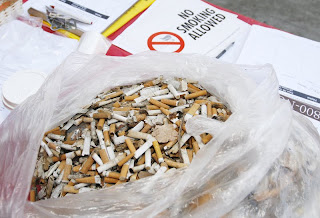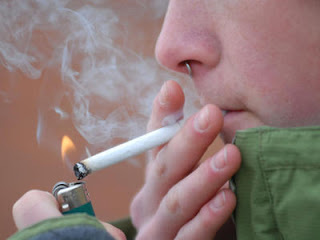
After a town hall meeting on Monday, students might not have to take their cigarettes off campus—at least for another month.
About 40 people attended a University Senate town hall on Monday afternoon to discuss the current 20-foot campus smoking ban and a potential full-campus ban. But the meeting was marked by a sense of gridlock, with supporters and opponents of a full ban sticking to their positions and senators still deliberating on when and if another vote would take place.
The senate had been expected to vote on a full smoking ban, as proposed by Business School senator Mark Cohen, at its plenary this Friday. But Cohen’s proposal changed between September 23, when he introduced it at the last USenate plenary, and the hearing on Monday. The original proposal called for a smoking ban on the Morningside Heights campus, and the new version calls to ban smoking throughout Columbia University.
Alex Frouman, CC ’12, University senator and co-chair of the student affairs committee, told Spectator after the hearing that because of the change in the proposal, it’s “no longer clear” that the senate will vote on the resolution at its plenary this Friday.
“With the senate, anything can happen,” Frouman said. “It’s procedurally possible … but there seems to no longer be the will to push it through on Friday.”
Frouman added that the current ban is reasonable and was implemented with plans to reevaluate the policy after two years, not nine months.
“The senate needs to build the trust of the community by keeping its word when passing a policy and sticking to the timeline,” he said.
After the town hall, University senator Kenny Durell, CC ’12, said that the senate would likely wait until November to vote.
“I think the real issue with the entire process is that the process hasn’t been seen to fruition,” Durell said.
Aki Terasaki, CC ’12 and president of Columbia College Student Council, agreed. On Sunday night, CCSC nearly unanimously passed a resolution stating that “proper signage has just been implemented, and as a result, the policy hasn’t been in place long enough to review the effects.”
Terasaki said that changing the policy would “provoke confusion in the student body,” and that CCSC will support the current policy for two years.
Senator and Business School professor Mark Cohen, the chief proponent of the full-campus ban, objected to Terasaki’s emphasis on student opinion.
“The University community doesn’t revolve around students as the sun, the moon, and the stars,” he said. “You don’t have the only voice in the room.”
The move to postpone a vote on a University-wide ban will likely be greeted with approval by Columbia’s smokers, several of whom came to the meeting to defend themselves—including Aram Avanessians, SEAS ’15, who gave a passionate speech in defense of his right to smoke.
“To fully rid the campus of smoking is to tell a smoker that they are not fully accepted as a proud member of this society,” he said. “Columbia has diagnosed my habit as a flaw in my human being.”
John Morris, a smoker and graduate student pursuing a Ph.D. in history, further described the proposal as “absurd” and “paternalistic,” calling it a product of the Columbia student body’s “self-righteous attitude towards whatever they deem to be unhealthy and culturally unacceptable.”
But few Columbia medical professionals said it was time for Columbia to follow the example of more than 350 other universities and ban smoking.
Sam Silverstein, chairman of Columbia’s department of physiology, was surprised that the senate was even debating the ban, since he said smoking was an urgent public health problem, not “an issue of liberty versus authority.”
“This is not a reasonable issue to be discussing in this way,” he said.











